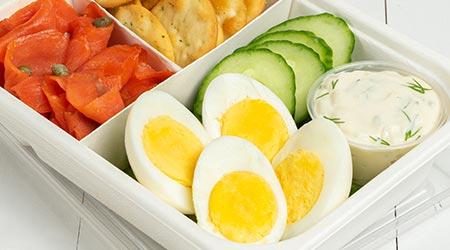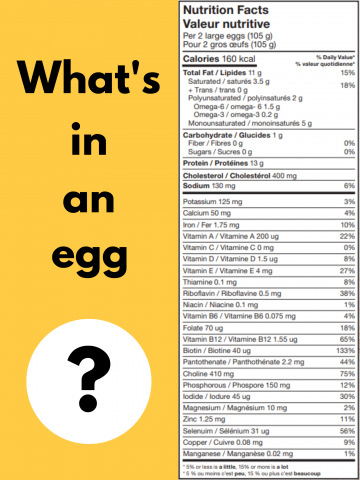"Is It Safe to Eat Raw Eggs?"

Our Answer:
June 14, 2020
Hi Carol,
We're so glad you asked this question! It's an important one. Let's make one thing clear off the bat - yes, raw eggs are certainly safe in Canada.
Canadian eggs, specifically, undergo an intense inspection process before they enter grocery stores. The main risk with raw eggs is salmonella infection but with Canadian eggs, the chances of finding these bacteria in your store-bought eggs are next to nothing.
Canadian inspection protocols cover mandatory salmonella testing, strict on-farm hygiene practices, a standardized code of quality production practices, cooling from farm to table, stringent egg grading standards and safe handling guidelines for grocery stores, restaurants and consumers. (In the US the possibility of salmonella is much higher than in Canada - if you've read information from the United States, please note that it does not apply here in Ontario).
That being said, we do have some points that we would like you to consider when eating raw eggs.
In Canada, in the very rare instances where eggs have been implicated in bacterial contamination, improper handling is typically the problem. If consumers choose to cook with and consume raw eggs, we recommend the following simple guidelines:
- Use eggs which have been graded (the carton will have a Grade A stamp and a best before date) and purchased from a grocery store where they have been kept refrigerated.
- Use fresh eggs, well before the best before date stamped on the carton.
- Use eggs which are clean and free of cracks, and which have been kept refrigerated in the main body of the refrigerator.
- Wash utensils, work surfaces and hands before handling food.
- Serve food immediately, or refrigerate until serving time and consume within a few hours, or freeze. (Same goes for leftovers).
Egg farmers are committed to providing consumers with the safest, highest quality, and most nutritious product possible. When you see the "Grade A" of Egg Quality Assurance (EQA) logo on the carton, you know those high-quality eggs meet all of the requirements for food safety and animal care.
FAQ
Are egg yolks safe to eat raw?
In Canada, shelled eggs that are before their best before date and have been properly stored and handled are safe to eat raw or undercooked. This includes both the egg white and egg yolk in the egg.
The Safety of Raw Egg Yolks
Egg yolks are a rich source of essential nutrients like vitamins A, D, E, and K, as well as healthy fats and cholesterol. However, some people have concerns about consuming raw egg yolks due to the risk of salmonella contamination. Salmonella is a type of harmful bacteria that can be present in eggs, and if ingested, it can lead to foodborne illness.
Canadian Egg Safety Standards
Fortunately, in Canada, the risk of salmonella contamination in store-bought eggs is significantly low. Canadian egg farmers adhere to stringent safety standards and guidelines to ensure the eggs' quality and minimize the risk of bacterial contamination.
The Canadian egg inspection process involves mandatory salmonella testing, strict on-farm hygiene practices, standardized code of quality production, and safe handling guidelines for both retailers and consumers. As a result, eggs that bear the "Canada Grade A" stamp on the carton meet these high safety standards and are safe to consume raw or undercooked as long as they are fresh and stored correctly.
Guidelines for Consuming Raw Egg Yolks
To ensure the safety of consuming raw or egg yolks, it's essential to follow some simple guidelines:
Purchase Grade A Eggs
Look for eggs that are graded and have the "Canada Grade A" stamp on the carton. This indicates that the eggs meet the highest quality and safety standards.
Check the Best Before Date
Ensure that you use the eggs well before the best before date mentioned on the carton.
Proper Storage
Keep the eggs refrigerated in the main body of the refrigerator, and avoid leaving them out at room temperature for extended periods.
Inspect for Quality
Before using, check the eggs for cleanliness and cracks. Avoid using eggs with damaged shells, as they are more susceptible to bacterial contamination.
Practice Proper Food Handling
Wash your hands, utensils, and work surfaces before handling eggs to prevent cross-contamination.
Consume Promptly
If you choose to eat raw egg yolks, serve the dish immediately, refrigerate until serving, or freeze the food for future use. Avoid leaving raw egg dishes at room temperature for too long.
In conclusion, raw egg yolks are safe to eat in Canada when following the recommended guidelines and choosing Grade A eggs from reputable sources. However, individuals with compromised immune systems, pregnant women, young children, and elderly individuals may be at a higher risk of foodborne illness and should exercise caution when consuming raw eggs.
Why do athletes drink raw eggs?
You may have seen athletes consuming raw eggs in the media, especially in movies and TV shows. Or, perhaps you know someone personally who regularly drinks raw eggs. In any case, the practice of drinking raw eggs has been popularized due to several perceived benefits for athletes:
High-Quality Protein
Eggs are a rich source of high-quality protein, containing all the essential amino acids required for muscle repair and growth. Athletes often believe that consuming raw eggs allows them to obtain protein faster, aiding in post-workout recovery and promoting muscle development.
Nutrient Density
Raw eggs contain essential nutrients such as vitamins, minerals, and healthy fats, including vitamin B12, choline, and omega-3 fatty acids. Athletes may view raw eggs as a natural and nutrient-dense food choice that can contribute to overall health and performance.
Convenience
Some athletes might opt for raw eggs as they are quick and easy to consume without the need for cooking or meal preparation.
Cooked vs. Raw Eggs
While raw eggs might offer some perceived benefits, research suggests that the body's protein and nutrient absorption from cooked eggs are significantly higher compared to raw eggs. Therefore, depending on how you cook your eggs, it is not more nutritional to eat cooked eggs than raw eggs.
For a healthy way to prepare eggs, try boiling or poaching your eggs in water. This allows you to cook the egg without adding oil, butter, or other additions that may add additional saturated fats and calories to your meal.
How do you make raw eggs safe to eat?
To ensure the safety of consuming raw or undercooked eggs in Canada, it is crucial to follow these guidelines:
Choose Eggs with the Canada Grade A logo
Opt for eggs that bear the "Canada Grade A" stamp on the carton. These eggs have undergone rigorous inspections and adhere to the highest quality and safety standards.
Check Freshness
Ensure that the eggs are fresh and well within their best before date as indicated on the carton. Using eggs before their expiration date reduces the risk of contamination.
Ensure Proper Storage
Keep the eggs refrigerated in the main body of the refrigerator, not in the door, and avoid leaving them at room temperature for extended periods.
Handle with Care
Prepare raw eggs in a clean environment with proper food handling practices. Wash hands, utensils, and surfaces thoroughly before and after handling eggs to prevent cross-contamination.
If one or more of these guidelines have been broken, it is best to consume the eggs in well-cooked dishes or not at all.
Pasteurized Eggs
Liquid egg products, like egg white cartons, typically use eggs that have been pasteurized. Pasteurized eggs go through a heating process that kills any possible bacteria, like salmonella, in the egg, resulting in a longer shelf-life.These eggs are also safe to eat raw given that they are stored properly and consumed before their best before date.
How do you know if an egg has salmonella?
Unfortunately, there is no visible way to tell if an egg has salmonella. An egg contaminated with salmonella may look, smell, and taste the same as a safe, fresh egg.
That is why it is incredibly important to follow proper food storage and handling guidelines. If your eggs are past their best before date, have not been stored properly, or have not been handled properly, it is recommended that they only be used in thoroughly-cooked dishes, or not consumed at all.
For more information on proper storage, handling and cooking guidelines, visit these resources:
Which is better: raw or boiled eggs?
When comparing the nutritional value of raw and boiled eggs, both types of eggs offer essential nutrients. However, there are some factors to consider that make boiled eggs a preferable choice for most people.
Nutritional Absorption
While raw eggs may contain slightly more nutrients than boiled eggs, the human body is better equipped to absorb the nutrients and protein from cooked eggs. Cooking eggs denatures the proteins, making them easier for our bodies to digest and absorb. Therefore, although raw eggs may boast a higher nutrient content, you are likely to get more nutritional benefit from consuming cooked eggs.
Enjoyment and Taste
Most people find that eating cooked eggs, such as boiled eggs, is more enjoyable than consuming raw eggs. The texture and taste of cooked eggs are often preferred, making them a popular choice for various egg-based dishes and snacks.
Related Questions
Can I safely pasteurize eggs using a sous vide machine for pregnancy?
Are eggs pasteurized for sale to the public
Can you sell fertilized eggs for Food consumption?
Do I have to wash my eggs to sell them from my farm?
How Much Sodium in an Egg?
What would cause my current eggs to have the yolk at the bottom (opposite the pointed end)?

















